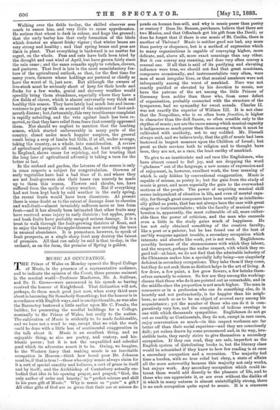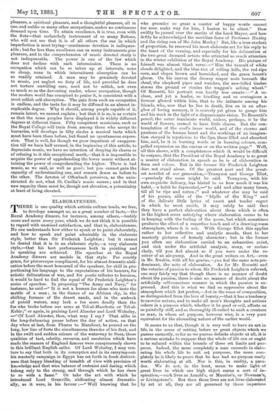MUSIC AS OCCUPATION.
THE Prince of Wales on Monday opened the Royal College of Music, in the presence of a representative audience, and to indicate the opinion of the Court, three persons eminent in the musical world—Professor Maefarren, Mr. A. Sullivan, and Dr. G. Grove—were announced in his speech as having received the honour of Knighthood. That distinction will not, perhaps, do them much good just now, when every third man about is becoming Sir Somebody Something; but the honour is in accordance with English ways, and is unobjectionable, as was also the Baronetcy bestowed a little earlier upon Mr. C. Freake, the builder, for presenting the needful buildings for a College, nominally to the Prince of Wales, but really to the nation. The cultivation of Music is evidently to be made fashionable, and we have not a word to say, except that we wish the work could be done with a little less of sentimental exaggeration in the talk about it. Music is an excellent thing, and an enjoyable thing, as also are poetry, and oratory, and his- trionic power ; but it is not the unqualified and celestial good which its advocates assert it to be. Owing, we imagine, to the Western fancy that making music is an inevitable occupation in Heaven—think how bored poor Dr. Johnson must be, if that is true 1—those who enjoy music always claim for it a sort of special sanctity and holiness, a sort of grace in itself and by itself; and the Archbishop of Canterbury actually em- bodied that idea in his opening prayer, and prayed; "God, the only author of order and beauty," to "perfect science and skill in his pure gift of Music." Why is music so " pure " a gift P All other gifts of God are so given that their use or misuse de- panda on human free-will, and why is music purer than poetry or oratory 13 Does Dr. Benson, perchance, believe that there are two Musics, and that Offenbach got his gift from the Devil; or does he forget that if there is one music of St. Cecilia, there is another of Th4rese P Music is neither good nor bad, any more than poetry or eloquence, but is a method of expression which to many organisations is capable of conveying higher, more delicate, and, above all, more exact meanings than any other. But it can convey any meaning, and does very often convey a sensual one. If all that is said of its purifying and elevating influence were true, we should not find that great musicians, composers occasionally, and instrumentalists very often, were men of most irregular lives, or that musical amateurs were not infrequently among the worst of mankind. Nero was not exactly purified or elevated by his devotion to music, nor have the patrons of the art among the little Princes of Germany been nobler than those who, from some defect of organisation, probably connected with the structure of the tympanum, had no sympathy for sweet sounds. Charles II. was not exactly the superior of William III. It is not clear that the Neapolitan, who is so often born fanatic°, is higher in character than the dull Saxon, so often sensible only to the rhythm of music; nor are the races among which musical capacity is indigenous so much purer than those among whom it must be cultivated with assiduity, not to say coddled. Mr. Disraeli always said, and we believe truly, that the gift of music had been bestowed in largest measure upon the Children of Israel; but great as their services both to religion and to thought have been, they are not, as a race, the least earthy of mankind.
To give to an inarticulate and sad race like Englishmen, who have almost ceased to feel joy, and are dropping the word " gladness " out of the language, a new means of expression and of enjoyment, is, however, excellent work, the true meaning of which is only hidden by conventional exaggeration. Music is capable of misuse, as poetry is; but the gain from the study of music is great, and more especially the gain to the overworked sections of the people. The power of acquiring musical skill seems independent of situation in life, and even of mental capa- city, for though great composers have been usually as intellectu- ally gifted as poets, that has not always been the case with great singers or instrumentalists; while the faculty of musical appre- hension is, apparently, the most culturable of- all, more cultur- able than the power of criticism, and the man who succeeds even a little in the study gains much of happiness. He has not only obtained something of the creative faculty, like a poet or a painter, but he has found one of the best of earthly weapons against trouble, a secondary occupation which interests and absorbs like work, yet is not work. Englishmen, possibly because of the strenuousness with which they labour, and the respect, perhaps the undue respect, with which they re- gard toil—at least, we do not find that the admirable industry of the Chinaman makes him a specially lofty being—are singularly deficient in secondary occupations. They take them if they come, but they do not seek them as distinct helps in the art of living. A few draw, a few paint, a few grow flowers, a few betake them- selves earnestly to science. So few are they among the working- classes that those who do it are pointed out as remarkable, and in the middle-class the proportion is not much higher. The man in commerce or in a profession who can do something else, do it heartily and not perfunctorily, is far happier than his neigh- bour, so much so as to be an object of avowed envy among his acquaintance ; yet the number of those who can do it is com- paratively very few, and the complaint of tedious evenings is one with which thousands sympathise. Englishmen do not go out so readily as Continentals, they do not, except in rare cases, enjoy conversation so much—in this respect workmen are far better off than their social superiors—and they are consciously dull; yet unless drawn by some pronounced and, in its way, irre- sistible taste, they rarely strive to give themselves a secondary occupation. If they can read, they are safe, imperfect as the English system of distributing books is, but the literary class would be astonished if they knew to how few reading is at once a secondary occupation and a recreation. The majority feel time a burden, with no true relief but sleep, a state of affairs all the more noteworthy because this majority not only works, but enjoys work. Any aecondary occupation which could in- terest them would add directly to the pleasure of life, and to those who can appreciate it, or are even without the dislike of it which in many natures is almost unintelligibly strong, there is no such occupation quite equal to music. It is a sensuous
pleasure, a spiritual pleasure, and a thoughtful pleasure, all in one, and unlike so many other occupations, makes no continuous demand upon time. To attain excellence, it is true, even with the flute—that melancholy instrument of so many Britons, who will not see that it. is of all others the one in which imperfection is most trying—continuous devotion is indispens- able; but far less than excellence can on many instruments give pleasure, and to the comprehension of music devoted study is not indispensable. The power is one of the few which does not decline with each intermission. There is no occupation which can be so taken up at intervals, none so cheap, none in which intermittent absorption can be so readily attained. A man may be genuinely devoted to music, yet neglect no duty of life, and provided he does not torture unwilling ears, need not be selfish, not even so much so as the devouring reader, whose occupation, though the modern world has conspired to praise it, is consistent with a most selfish self-absorption. The gain from such an occupation is endless, and the taste for it may be diffused to an almost in- explicable degree. Why it should, among people capable of it, remain latent, we cannot explain ; but that it is so, is as certain as that the same peoples have displayed it in widely different degrees at different times. Fifty competent musicians, such as the Royal College will train from among those who accept its bursaries, will develope in fifty circles a musical taste which must have been there before, but found no spontaneous expres- sion. That is well, for though we grow impatient of exaggera- tion till we have half seemed, in the beginning of this article, to depreciate music, we have no intention of denying its charm or of refusing to it this exceptional merit,—that it is impossible to acquire the power of apprehending the lower music without at- taining the power of comprehending the higher. There is bad music, as we said, as well as good; but you cannot gain the capacity of understanding one, and remain dense as before to the other. The devotee of Offenbach perceives, as the unin- structed do not, what St. Cecilia's music means ; and in that new capacity there must be, though not elevation, a potentiality at least of being elevated.



































 Previous page
Previous page